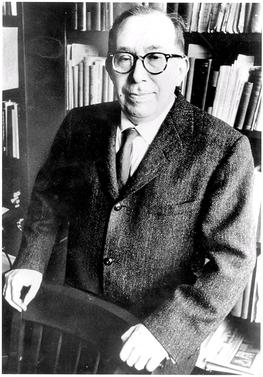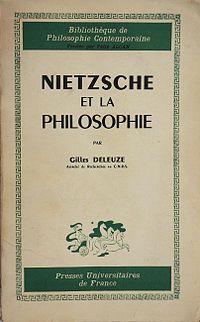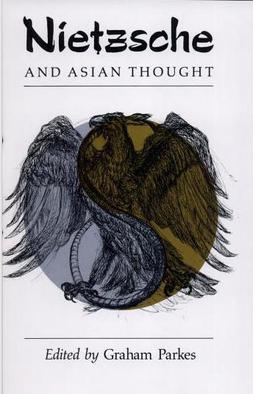Related Research Articles

Gilles Louis René Deleuze was a French philosopher who, from the early 1950s until his death in 1995, wrote on philosophy, literature, film, and fine art. His most popular works were the two volumes of Capitalism and Schizophrenia: Anti-Oedipus (1972) and A Thousand Plateaus (1980), both co-written with psychoanalyst Félix Guattari. His metaphysical treatise Difference and Repetition (1968) is considered by many scholars to be his magnum opus.

Nihilism is a family of views within philosophy that rejects generally accepted or fundamental aspects of human existence, such as knowledge, morality, or meaning. The term was popularized by Ivan Turgenev and more specifically by his character Bazarov in the novel Fathers and Sons.

Martin Heidegger was a German philosopher who is best known for contributions to phenomenology, hermeneutics, and existentialism. He is often considered to be among the most important and influential philosophers of the 20th century.

Leo Strauss was a German American scholar of political philosophy who specialized in classical political philosophy. Born in Germany to Jewish parents, Strauss later emigrated from Germany to the United States. He spent much of his career as a professor of political science at the University of Chicago, where he taught several generations of students and published fifteen books.

The Kyoto School is the name given to the Japanese philosophical movement centered at Kyoto University that assimilated Western philosophy and religious ideas and used them to reformulate religious and moral insights unique to the East Asian philosophical tradition. However, it is also used to describe postwar scholars who have taught at the same university, been influenced by the foundational thinkers of Kyoto school philosophy, and who have developed distinctive theories of Japanese uniqueness. To disambiguate the term, therefore, thinkers and writers covered by this second sense appear under The Kyoto University Research Centre for the Cultural Sciences.
Dasein is the German word for 'existence'. It is a fundamental concept in the existential philosophy of Martin Heidegger. Heidegger uses the expression Dasein to refer to the experience of being that is particular to human beings. Thus it is a form of being that is aware of and must confront such issues as personhood, mortality and the dilemma or paradox of living in relationship with other humans while being ultimately alone with oneself.

Being and Time is the 1927 magnum opus of German philosopher Martin Heidegger and a key document of existentialism. Being and Time had a notable impact on subsequent philosophy, literary theory and many other fields. Though controversial, its stature in intellectual history has been compared with works by Kant and Hegel. The book attempts to revive ontology through an analysis of Dasein, or "being-in-the-world." It is also noted for an array of neologisms and complex language, as well as an extended treatment of "authenticity" as a means to grasp and confront the unique and finite possibilities of the individual.

Walter Arnold Kaufmann was a German-American philosopher, translator, and poet. A prolific author, he wrote extensively on a broad range of subjects, such as authenticity and death, moral philosophy and existentialism, theism and atheism, Christianity and Judaism, as well as philosophy and literature. He served more than 30 years as a professor at Princeton University.
Stanley Rosen was Borden Parker Bowne Professor of Philosophy and Professor Emeritus at Boston University. His research and teaching focused on the fundamental questions of philosophy and on the most important figures of its history, from Plato to Heidegger.
John Sallis is an American philosopher well known for his work in the tradition of phenomenology. Since 2005, he has been the Frederick J. Adelmann Professor of Philosophy at Boston College. He has previously taught at Pennsylvania State University (1996–2005), Vanderbilt University (1990–1995), Loyola University of Chicago (1983–1990), Duquesne University (1966–1983) and the University of the South (1964–1966).
Babette Babich is an American philosopher who writes from a continental perspective on aesthetics, philosophy of science, especially Nietzsche's, and technology, especially Heidegger's and Günther Anders, in addition to critical and cultural theory.
David Farrell Krell, is an American philosopher. He is professor emeritus of philosophy at DePaul University. He received his Ph.D. in philosophy at Duquesne University, where he wrote his dissertation on Heidegger and Nietzsche. He has taught at many universities in Germany, France, and England. Specializing in Continental Philosophy, he has written many books on Heidegger and Nietzsche, including Daimon Life: Heidegger and Life Philosophy (1992), Intimations of Mortality: Time, Truth, and Finitude in Heidegger's Thinking of Being (1986), The Good European: Nietzsche's Work Sites in Word and Image (1997), and Infectious Nietzsche (1996). Additionally, Krell has written extensively about German Idealism, his books in this area include The Tragic Absolute: German Idealism and the Languishing of God (2005), and Contagion: Sexuality, Disease, and Death in German Idealism and Romanticism. Krell has also translated Heidegger's lectures on Nietzsche, and was the editor of Heidegger's Basic Writings (1977). In a 2005 interview, Krell cited Jacques Derrida as a major influence on his work on Nietzsche.

Nietzsche and Philosophy is a 1962 book about Friedrich Nietzsche by the philosopher Gilles Deleuze, in which the author treats Nietzsche as a systematically coherent philosopher, discussing concepts such as the will to power and the eternal return. Nietzsche and Philosophy is a celebrated and influential work. Its publication has been seen as a significant turning-point in French philosophy, which had previously given little consideration to Nietzsche as a serious philosopher.
Michael Allen Gillespie is an American philosopher and Professor of Political Science and Philosophy at Duke University. His areas of interest are political philosophy, continental philosophy, history of philosophy, and the origins of modernity. He has published on the relationship between theology and philosophy, medieval theology, liberalism, and a number of philosophers such as Nietzsche, Hegel, Heidegger, and Kant.

Nietzsche and Asian Thought is an anthology of essays by a variety of contributors on the relationship of the thought of German philosopher Friedrich Nietzsche to Asian philosophy; specifically, Indian, Chinese and Japanese philosophy. The book was edited by American philosopher Graham Parkes and was released in 1991 by the University of Chicago Press. The work was written for a Western audience of Nietzsche scholars and comparative philosophers, but features contributions from non-Western thinkers.
John Llewelyn was a Welsh-born British philosopher whose extensive body of work, published over a period of more than forty years, spans the divide between Analytical and Continental schools of contemporary thought. He has conjoined the rigorous approach to matters of meaning and logic typical of the former and the depth and range of reference typical of the latter in a constructive and critical engagement with the work of Jacques Derrida and Emmanuel Levinas.

Buddhist thought and Western philosophy include several parallels.

Marc Crépon is a French philosopher and academic who writes on the subject of languages and communities in the French and German philosophies and contemporary political and moral philosophy. He has also translated works by philosophers such as Nietzsche, Franz Rosenzweig and Leibniz.
Joan Stambaugh was an American philosopher and professor of philosophy at City University of New York. She is known for her translations of the works of Martin Heidegger.
References
- ↑ "Guest researcher". philosophie.univie.ac.at. Retrieved 19 February 2022.
- ↑ "Graham Parkes". press.uchicago.edu.
- ↑ Reynolds, Alexander (February 1993). "Graham Parkes (ed.): Nietzsche and Asian thought, xii, 253 pp. Chicago and London: University of Chicago Press, 1991. £21.95, $31.75". Bulletin of the School of Oriental and African Studies. 56 (1): 176–177. doi:10.1017/S0041977X00002196. S2CID 163061248.